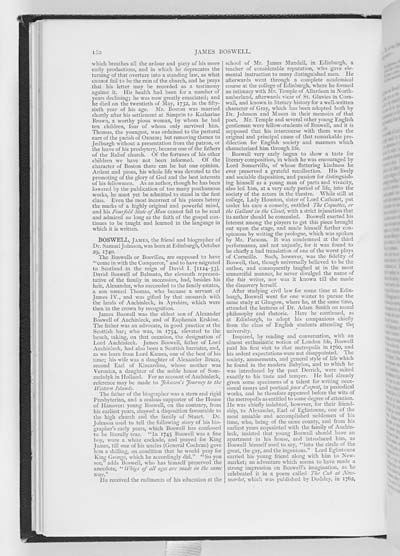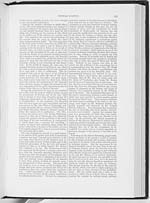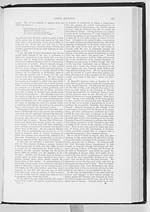160
which breathes all the ardour and piety of his more
early productions, and in which he deprecates the
turning of that overture into a standing law, as what
cannot fail to be the ruin of the church, and he prays
that his letter may be recorded as a testimony
against it. His health had been for a number of
years declining; he was now greatly emaciated; and
he died on the twentieth of May, 1732, in the fifty-
sixth year of his age. Mr. Boston was married
shortly after his settlement at Simprin to Katharine
Brown, a worthy pious woman, by whom he had
ten children, four of whom only survived him.
Thomas, the youngest, was ordained to the pastoral
care of the parish of Oxnam; but removing thence to
Jedburgh without a presentation from the patron, or
the leave of his presbytery, became one of the fathers
of the Relief church. Of the fortunes of his other
children we have not been informed. Of the
character of Boston there can be but one opinion.
Ardent and pious, his whole life was devoted to the
promoting of the glory of God and the best interests
of his fellowmen. As an author, though he has been
lowered by the publication of too many posthumous
works, he must yet be admitted to stand in the first
class. Even the most incorrect of his pieces betray
the marks of a highly original and powerful mind,
and his Fourfold State of Man cannot fail to be read
and admired so long as the faith of the gospel con-
tinues to be taught and learned in the language in
which it is written.
BOSWELL, JAMES, the friend and biographer of
Dr. Samuel Johnson, was born at Edinburgh, October
29, 1740.
The Boswells or Bosvilles, are supposed to have
"come in with the Conqueror," and to have migrated
to Scotland in the reign of David I. [1124-53].
David Boswell of Balmuto, the eleventh represen-
tative of the family in succession, had, besides his
heir, Alexander, who succeeded to the family estates,
a son named Thomas, who became a servant of
James IV., and was gifted by that monarch with
the lands of Auchinleck, in Ayrshire, which were
then in the crown by recognition.
James Boswell was the eldest son of Alexander
Boswell of Auchinleck, and of Euphemia Erskine.
The father was an advocate, in good practice at the
Scottish bar; who was, in 1754, elevated to the
bench, taking, on that occasion, the designation of
Lord Auchinleck. James Boswell, father of Lord
Auchinleck, had also been a Scottish barrister, and,
as we learn from Lord Kames, one of the best of his
time; his wife was a daughter of Alexander Bruce,
second Earl of Kincardine, whose mother was
Veronica, a daughter of the noble house of Som-
melsdyk in Holland. For an account of Auchinleck,
reference may be made to Johnson's Journey to the
Western Islands.
The father of the biographer was a stern and rigid
Presbyterian, and a zealous supporter of the House
of Hanover: young Boswell, on the contrary, from
his earliest years, showed a disposition favourable to
the high church and the family of Stuart. Dr.
Johnson used to tell the following story of his bio-
grapher's early years, which Boswell has confessed
to be literally true. "In 1745 Boswell was a fine
boy, wore a white cockade, and prayed for King
James, till one of his uncles (General Cochran) gave
him a shilling, on condition that he would pray for
King George, which he accordingly did." "So you
see," adds Boswell, who has himself preserved the
anecdote, " Whigs of all ages are made in the same
way."
He received the rudiments of his education at the
school of Mr. James Mundell, in Edinburgh, a
teacher of considerable reputation, who gave ele-
mental instruction to many distinguished men. He
afterwards went through a complete academical
course at the college of Edinburgh, where he formed
an intimacy with Mr. Temple of Allardeen in North-
umberland, afterwards vicar of St. Gluvies in Corn-
wall, and known in literary history for a well-written
character of Gray, which has been adopted both by
Dr. Johnson and Mason in their memoirs of that
poet. Mr. Temple and several other young English
gentleman were fellow-students of Boswell, and it is
supposed that his intercourse with them was the
original and principal cause of that remarkable pre-
dilection for English society and manners which
characterized him through life.
Boswell very early began to show a taste for
literary composition, in which he was encouraged by
Lord Somerville, of whose flattering kindness he
ever preserved a grateful recollection. His lively
and sociable disposition, and passion for distinguish-
ing himself as a young man of parts and vivacity,
also led him, at a very early period of life, into the
society of the actors in the theatre. While still at
college, Lady Houston, sister of Lord Cathcart, put
under his care a comedy, entitled The Coquettes, or
the Gallant in the Closet, with a strict injunction that
its author should be concealed. Boswell exerted his
interest among the players to get this piece brought
out upon the stage, and made himself further con-
spicuous by writing the prologue, which was spoken
by Mr. Parsons. It was condemned at the third
performance, and not unjustly, for it was found to
be chiefly a bad translation of one of the worst plays
of Corneille. Such, however, was the fidelity of
Boswell, that, though universally believed to be the
author, and consequently laughed at in the most
unmerciful manner, he never divulged the name of
the fair writer, nor was it known till she made
the discovery herself.
After studying civil law for some time at Edin-
burgh, Boswell went for one winter to pursue the
same study at Glasgow, where he, at the same time,
attended the lectures of Dr. Adam Smith on moral
philosophy and rhetoric. Here he continued, as
at Edinburgh, to adopt his companions chiefly
from the class of English students attending the
university.
Inspired, by reading and conversation, with an
almost enthusiastic notion of London life, Boswell
paid his first visit to that metropolis in 1760, and
his ardent expectations were not disappointed. The
society, amusements, and general style of life which
he found in the modern Babylon, and to which he
was introduced by the poet Derrick, were suited
exactly to his taste and temper. He had already
given some specimens of a talent for writing occa-
sional essays and poetical jeux d'esprit, in periodical
works, and he therefore appeared before the wits of
the metropolis as entitled to some degree of attention.
He was chiefly indebted, however, for their friend-
ship, to Alexander, Earl of Eglintoune, one of the
most amiable and accomplished noblemen of his
time, who, being of the same county, and from his
earliest years acquainted with the family of Auchin-
leck, insisted that young Boswell should have an
apartment in his house, and introduced him, as
Boswell himself used to say, "into the circle of the
great, the gay, and the ingenious." Lord Eglintoune
carried his young friend along with him to New-
market; an adventure which seems to have made a
strong impression on Boswell's imagination, as he
celebrated it in a poem called The Cub at New-
market, which was published by Dodsley, in 1762,

![]() Universal Viewer |
Universal Viewer | ![]() Mirador |
Large image | Transcription
Mirador |
Large image | Transcription
![]()

